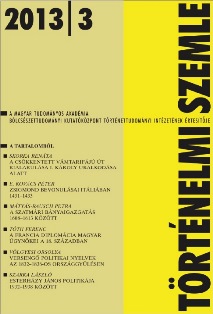Kisebbségvédelem, autonómia és revízió. Esterházy János szerepe a csehszlovákiai magyar politika alakításában 1932–1938
Protection of Minorities, Autonomy and Revision. The Role of János Esterházy in the Formation of the Hungarian Policy in Czechoslovakia
1932–1938
Author(s): László SzarkaSubject(s): History
Published by: Magyar Tudományos Akadémia Bölcsészettudományi Kutatóközpont Történettudományi Intézet
Summary/Abstract: The present study starts with an examination of the changes in the historiographical and political appreciation of János Esterházy, who played an outstanding role in the party politics of the Hungarian minority in Czechoslovakia in the 1930s, and of the divergent attitudes of Hungarian, Czech and Slovak historiography. Consequently, it focusses on three questions. At first it examines the influences of Hungarian revisionist foreign policy, which became more intensive in connection with domestic changes and the accession to power of Hitler in Germany, on the behaviour of Hungarian ethnic parties in Czechoslovakia. The role of Esterházy gained momentum in the process in the course of which the government policy at Budapest, not content with the ethnic party system which had prevailed thus far, forced the fusion of the christian socialist and the national parties, giving birth to the United Hungarian Party in Czechoslovakia in 1936. As president of the party, and then as MP in Prague, the prime goal of János Esterházy was to widen continuously the scope of minority rights, and posed as the champion of initiatives aimed at enlarging those rights against the Czechoslovak government, while always taking care to avoid the traps of governmental cooperation. At the same time, he was in continuous contact with the government circles at Budapest, and through the Hungarian embassy he informed the Hungarian Ministry of Foreign Affairs and the Bureau of the Prime Minister about his steps. On the other hand, he made efforts to adapt himself to those measures which could be interpreted as manifestations of a certain self-correction on the part of Czechoslovak policy towards the minorities. The study pays special attention to the discussions between President Edvard Beneš and János Esterházy, and to the reception among the minority Hungarians of the ethnic statute which was initiated by prime minister Milan Hodža. In the Slovak question, which was decisive from the point of view of the fi rst Czechoslovak Republic, Esterházy tried in vain to push to the fore the Hungarian interests and orientation of the autonomy policy represented by the Slovak People’s Party. In the last section, the author examines the special features in Slovakia and among the local Hungarian minority of the settlement of the Czechoslovak crisis by the great powers, and the German receptions of the Slovak efforts at independence. The success of Hungarian revisionist policy at Vienna, the Slovak autonomy, and then the establishment of the independent Slovak state, in contrast to the political aspirations of the Hungarian minority in Czechoslovakia in the interwar period, realised not global but ethnic revision. The role of Esterházy in this process full of conflict was, subjected to decisions of domestic and foreign policy, rather limited.
Journal: Történelmi Szemle
- Issue Year: 2013
- Issue No: 03
- Page Range: 425-449
- Page Count: 25
- Language: Hungarian

